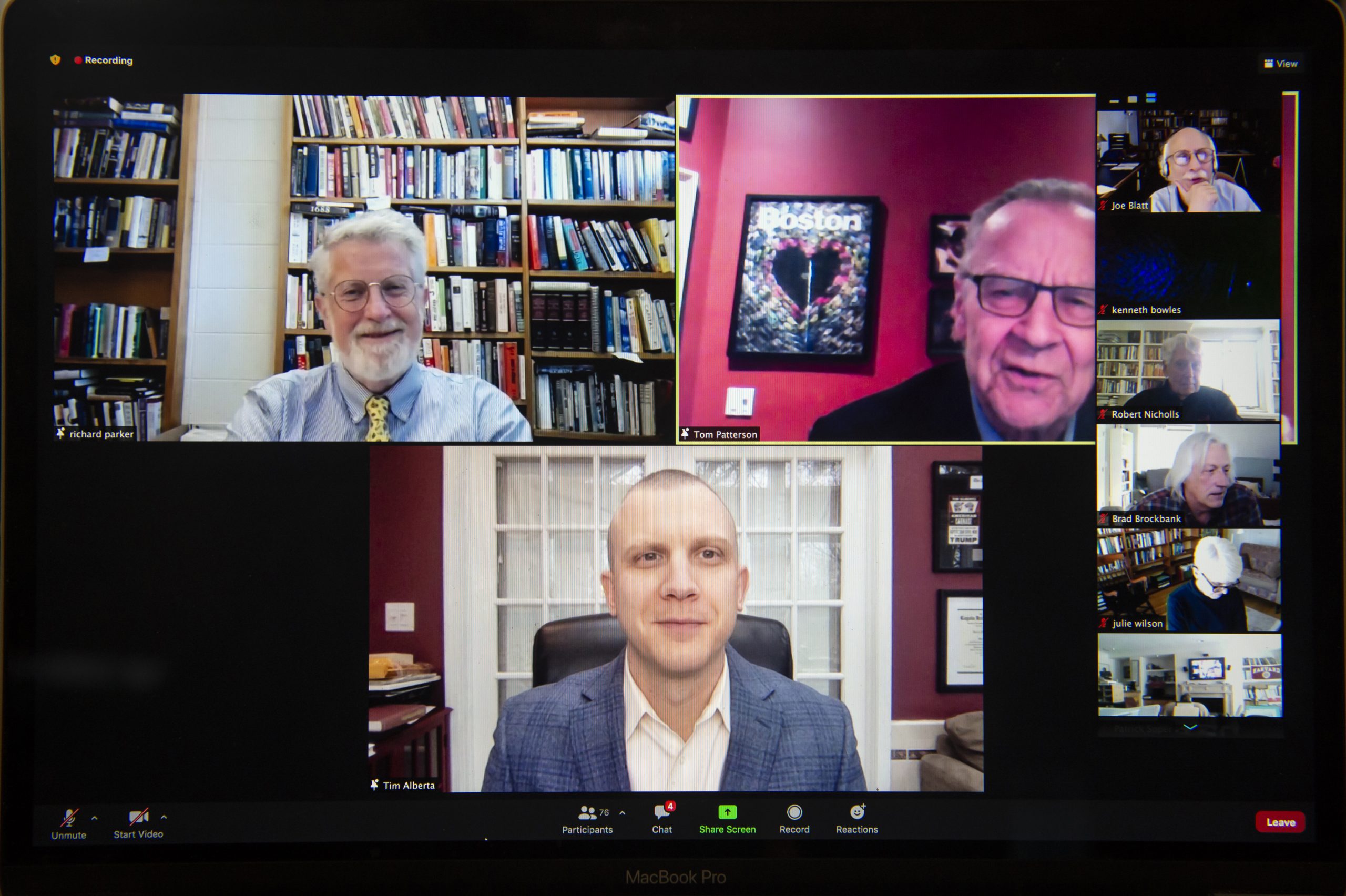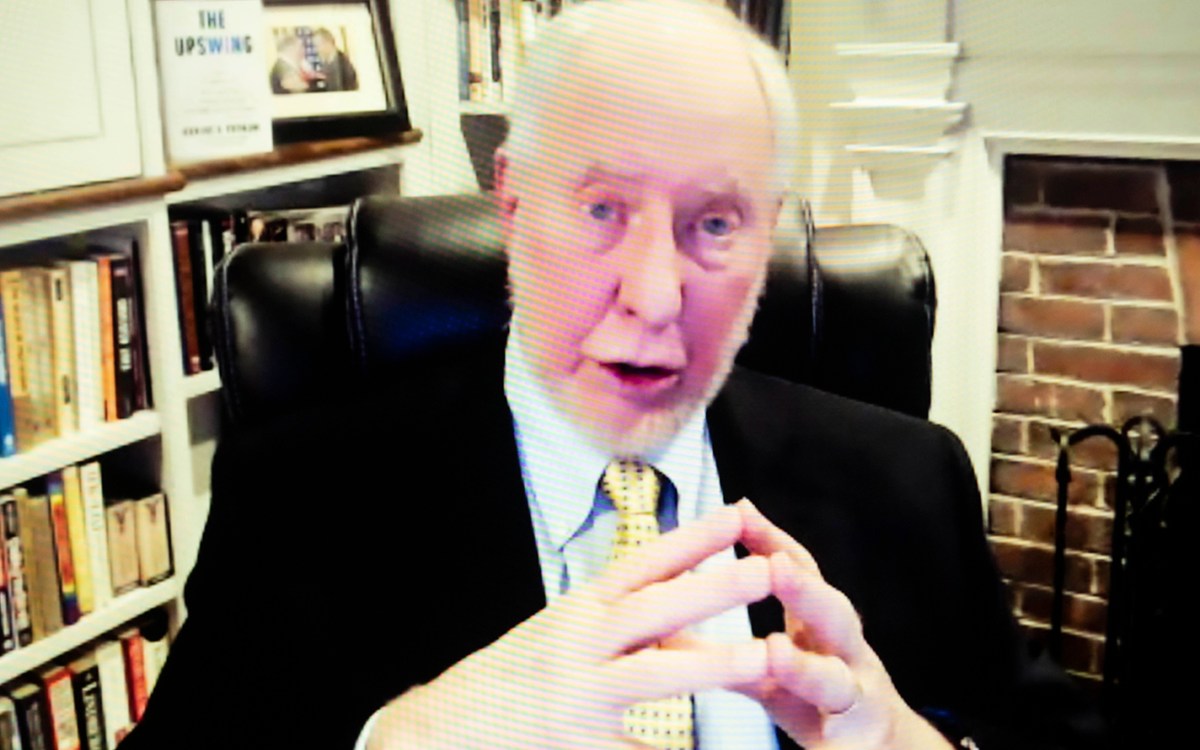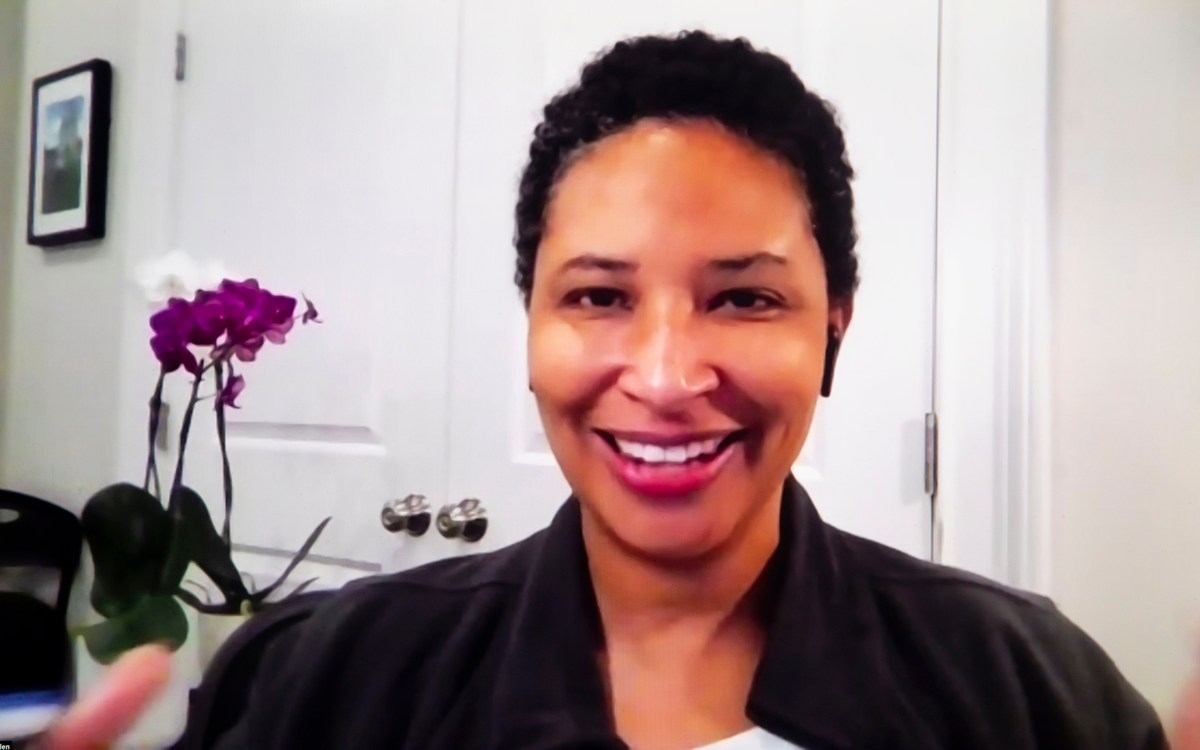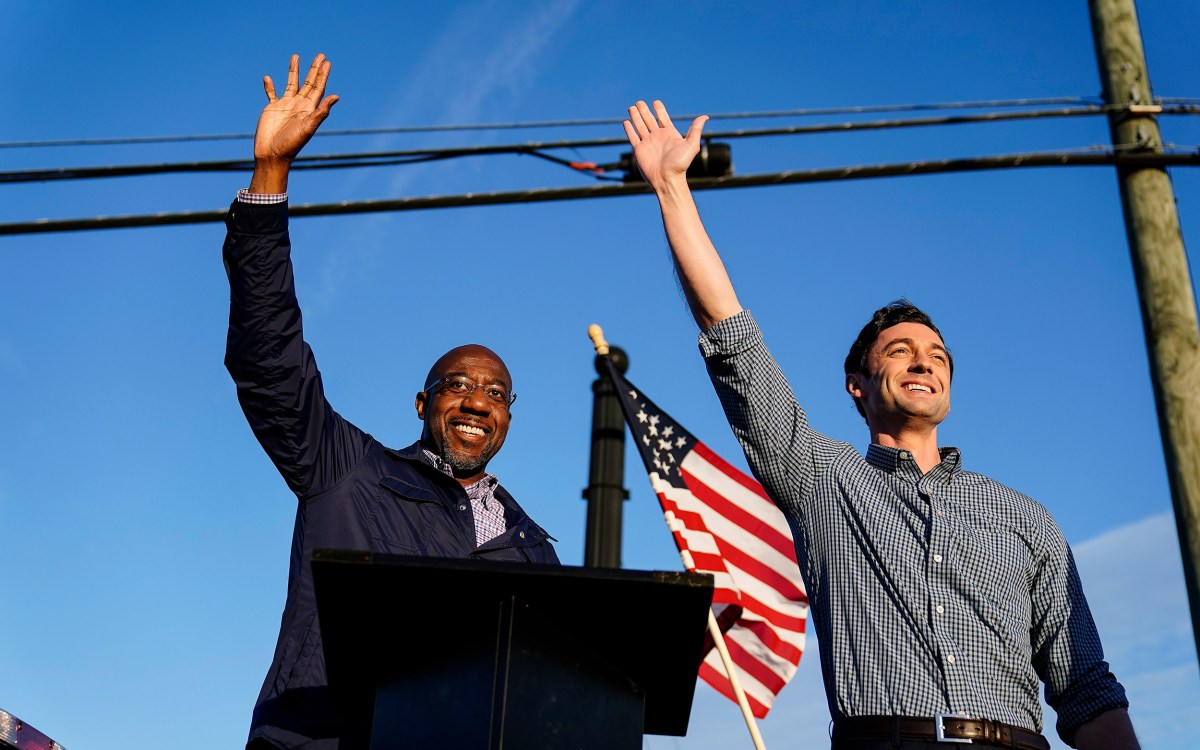
Richard Parker (clockwise top left), Tom Patterson, and Tim Alberta discuss the future of the GOP.
Jon Chase/Harvard Staff Photographer
The GOP house divided
Battle joined over the party’s traditional values and those of Trump
Like Will Rogers’ famous quote, “I am not a member of any organized political party. I am a Democrat,” it’s usually the Democrats who get tagged as being in disarray, with the more left-leaning and centrist blocs of the party locked in internecine battles.
But ever since Donald Trump entered the Republican primary in 2015, the GOP has been at war with itself, undergoing seismic, previously unimaginable shifts to its identity, mission, and core values — ceding traditional positions on small government, low taxes, supply-side economics, free-market trade, and foreign policy alliances to Trump’s mercurial personality and uncompromising ideology. Though that process is not yet over, despite losing the 2020 election as an incumbent president, Trump’s vision has prevailed and loyalty to him appears paramount above all else.
Why are so many elected members of the Republican Party still following Trump? Self-preservation, said Tim Alberta, who covered Republican and conservative politics for Politico magazine and is a newly named staff writer for The Atlantic, during a Shorenstein Center virtual talk about the GOP’s future with Harvard Kennedy School lecturer Richard Parker on Tuesday.
In the month before the 2020 election, Alberta said most Republicans he spoke to around the country were “preparing for doomsday” on Nov. 3. “It was Trump’s handling of the pandemic; it was his general ineptitude and carelessness and callousness in office; it was [his] turning off suburban women; it was this question of these disaffected Democrats, blue-collar workers who came out and voted for him in 2016 — will they come back out?” he said.
Their plan was to regroup and prepare for life after Trump. Instead, Trump’s 6 million surge in votes over 2016 and gains among Black and Latinx voters was a “worst-case scenario” for the party because it meant there could be no clean break from Trump while Republican voters were still with him, said Alberta, author of “American Carnage” (2019), about the GOP “civil war” during Trump’s presidency.
Many Republican members of Congress told Alberta behind closed doors that they “loathed” Trump but also see that he continues to have robust support among their constituents. So they have calculated that they cannot afford to throw the former president overboard and turn their backs on millions of voters they’ll need for themselves in the 2022 midterms and 2024 presidential election, he said.
Asked whether Biden and the Democrats can do anything to win over a share of Trump Republicans in the next two to four years, Alberta said it’s possible, but probably unlikely.
“They will identify as Republicans, conservatives, and Christians, in that order. And I think that’s driving a great deal of the blind loyalty to Trump.”
Tim Alberta
A significant number of high-earning, college-educated Republican voters in key suburban counties in Wisconsin and Michigan abandoned Trump to support the Democrat, Joe Biden, in the 2020 election. Data shows a further exodus from Republican voter rolls after the Jan. 6 insurrection. Those standing by the party are primarily concerned with “culture war” topics like transgender athletes and social media’s “de-platforming” of conservatives. Even if Biden delivers a revitalized economy in the next 18 to 24 months, that no longer seems to matter to the remaining Party faithful, he said.
Getting beyond this era of zero-sum partisanship in Washington will require one thing.
“You’ve got to elect better people,” said Alberta. “Anybody who spends more than about 48 hours wandering the halls of Congress … watching members up close … walk[s] away stunned at the caliber of individual that we send to Washington, D.C.”
Too many are in heavily gerrymandered districts, which incentivizes extremist views and bomb-throwing in order to satisfy constituents, which leads inevitably to “ineffectual” governing, he said.
“Everybody understands that we’ve got some problems in this country that could be solved rather easily if you had people who were willing to operate in good faith and with some intellectual honesty,” said Alberta.
Though it appears complicated, immigration, for example, is a “relatively straightforward” issue that Republicans and Democrats have been close to resolving for 20 years, he said.
“The reason they can’t solve it is because you have too many members in both parties who are unwilling to go home and have to explain a really hard vote to their constituents.”
Craven opportunism is not entirely to blame. Alberta said he talked to ordinary folks about immigration, Black Lives Matter, and Blue Lives Matter, mass incarceration, and other hot-button sociocultural issues to better understand what animated voters as he traveled around the country in the months before the 2020 election. He paid particular attention to those in deep Red states, where only a small subset of voters in primaries determines who gets or keeps their job in Washington, D.C.
After hearing them out, “You walk away with a very clear understanding of why their representatives in Washington are willing to act and talk and conduct themselves in a certain way,” he said.
The sway of race and religion in Republican politics has surfaced and shifted over the last decade. Looking back, Alberta said he’s come away “feeling ever more convinced that race was playing a larger role than we were ever necessarily comfortable acknowledging.”
Conservative views once considered aberrant are now acceptable, from birtherism — the false claim that President Barack Obama was born in Kenya — to conspiracies such as QAnon and the untrue declarations that the 2020 election was stolen by fraudulent votes cast in heavily Black, Democratic areas.
“If we’ve learned anything over the last 18 months, it’s that there can no longer be any real distinguishing between the mainstream of Republican politics and the fringe of Republican politics,” he said. “That much is just abundantly clear.”
The political influence that organized religion, particularly evangelical Christian churches and lobbying groups like the Moral Majority, once had to set the agenda within the Republican Party has significantly waned in recent years, said Alberta.
The symbiotic relationship between the two remains strong, but where conservative churchgoers were once reliable Republican voters on a specific issue like abortion, today, most are party affiliates for vaguely-defined reasons, like patriotism or support for police.
“They will identify as Republicans, conservatives, and Christians, in that order. And I think that’s driving a great deal of the blind loyalty to Trump,” he said. So while religious leaders and organizations have lost political power, “somehow, at the grassroots level, it’s far more potent, far more vitriolic, and certainly more passionate than it ever was before.”







